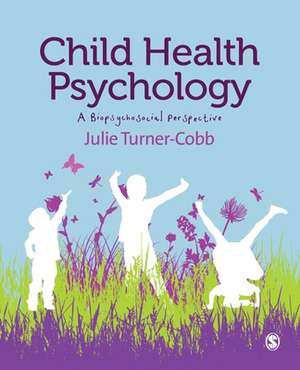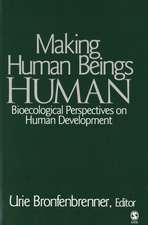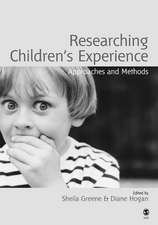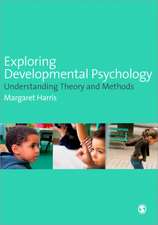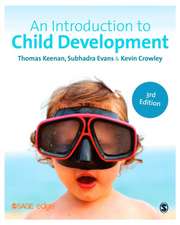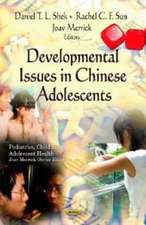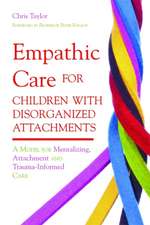Child Health Psychology: A Biopsychosocial Perspective
Autor Julie Turner-Cobben Limba Engleză Paperback – 9 dec 2013
"A long overdue prioritisation of child and adolescent health psychology... Taking an interdisciplinary stance to a textbook can be a difficult task. However, despite introducing a variety of concepts, this text is very accessible and a joy to read. A use of both old and new case studies and examples helps to chart the progress in the field... an excellent book for health psychology modules and postgraduate teaching."
- The Psychologist
"This book is well evidenced, has a sound theoretical and scientific basis, and at the same time is insightful and readable – reflecting the author’s enthusiasm for the topic. It will stimulate the reader to find out more about this fascinating area."
- Vivien Swanson, University of Stirling
"Engagingly written in a style that draws the reader in, it covers all the bases and provides an excellent introduction to the area."
- Paul D. Bennett, Swansea University
Child Health Psychology: A Biopsychosocial Perspective is the first sole-authored textbook dedicated to the topic of health psychology as it applies to children and adolescents, drawing on research from several related disciplines including psychoneuroimmunology and developmental psychobiology.
With an overarching biopsychosocial lifespan perspective, Turner-Cobb examines the effects of early life experience on health outcomes, as well as covering the experience of acute and chronic illness during childhood. Lots of helpful aids are provided per chapter including key learning objectives, textboxes putting spotlights on key pieces of research, lists of key concepts to revise, useful websites and further reading suggestions.
With a perspective designed to both inform and to challenge, this stimulating textbook will introduce you to the central relevance and many applications of child health psychology. It will be of interest to final year undergraduate and postgraduate students in health and clinical psychology, as well as to students in health sciences, nursing, and childhood studies.
Preț: 437.56 lei
Nou
Puncte Express: 656
Preț estimativ în valută:
83.74€ • 87.10$ • 69.13£
83.74€ • 87.10$ • 69.13£
Carte disponibilă
Livrare economică 24 martie-07 aprilie
Livrare express 08-14 martie pentru 41.15 lei
Preluare comenzi: 021 569.72.76
Specificații
ISBN-13: 9781849205917
ISBN-10: 1849205914
Pagini: 360
Ilustrații: illustrations
Dimensiuni: 186 x 232 x 18 mm
Greutate: 0.59 kg
Ediția:New.
Editura: SAGE Publications
Colecția Sage Publications Ltd
Locul publicării:London, United Kingdom
ISBN-10: 1849205914
Pagini: 360
Ilustrații: illustrations
Dimensiuni: 186 x 232 x 18 mm
Greutate: 0.59 kg
Ediția:New.
Editura: SAGE Publications
Colecția Sage Publications Ltd
Locul publicării:London, United Kingdom
Recenzii
Provides a long overdue prioritisation of child and adolescent health psychology, relating this to later functioning in a lifespan perspective... An invaluable aspect of this book is its research methods section: providing accessible details on psychobiological assessment, including stress, neurotransmitter and endocrine markers... Discussion is highlighted throughout by helpful figures charting biological aspects that many psychologists may be new to, such as the biological life cycle of stress, as well as complex theories and cognitions, such as young children's experiences of pain... Taking an interdisciplinary stance to a textbook can be a difficult task. However, despite introducing a variety of concepts, this text is very accessible and a joy to read. A use of both old and new case studies and examples helps to chart the progress in the field... an excellent book for health psychology modules and postgraduate teaching, providing an introduction to both child-focused research and biological measurements.
BPS members can read the full review here.
A comprehensive overview of how health psychology relates to children’s health is long overdue. Many of the theories within health psychology have been developed in relation to adult populations, and it is unclear how they might apply to children and young people at different developmental stages. This book is well evidenced, has a sound theoretical and scientific basis, and at the same time is insightful and readable – reflecting the author’s enthusiasm for the topic. It will stimulate the reader to find out more about this fascinating area.
Health psychology has lacked a text book focusing on child health psychology, but has now found one with this excellent text by Julie Turner-Cobb. Engagingly written in a style that draws the reader in, it covers all the bases and provides an excellent introduction to the area.
This is a welcome book which meets a long-neglected need in the field of child and adolescent welfare. It will be an invaluable reference for academics and clinical practitioners alike, but given that Dr Turner-Cobb writes in such an engaging and lucid style the book should appeal to general readers wishing to gain an understanding of this important topic. Thoroughly recommended.
BPS members can read the full review here.
A comprehensive overview of how health psychology relates to children’s health is long overdue. Many of the theories within health psychology have been developed in relation to adult populations, and it is unclear how they might apply to children and young people at different developmental stages. This book is well evidenced, has a sound theoretical and scientific basis, and at the same time is insightful and readable – reflecting the author’s enthusiasm for the topic. It will stimulate the reader to find out more about this fascinating area.
Health psychology has lacked a text book focusing on child health psychology, but has now found one with this excellent text by Julie Turner-Cobb. Engagingly written in a style that draws the reader in, it covers all the bases and provides an excellent introduction to the area.
This is a welcome book which meets a long-neglected need in the field of child and adolescent welfare. It will be an invaluable reference for academics and clinical practitioners alike, but given that Dr Turner-Cobb writes in such an engaging and lucid style the book should appeal to general readers wishing to gain an understanding of this important topic. Thoroughly recommended.
Cuprins
PART ONE: AN INTRODUCTION TO CHILD HEALTH AND WELL-BEING
Chapter 1: Introduction: What Is Child Health Psychology?
Definition of child health psychology
The psychosocial context of child health
The deveopmental context of child health
The mind-body link: from medieval to moder-day views
The mind-body connection in modern times
Health-related behaviour and social cognition models
The changing face of health threats
Communicating health
Chapter 2: Defining Health, Illness and Well-Being
Definitions of health and illness
Stress and coping: chronic versus acute stress
The relevance of cognitive and social development in health and illness
How can psychosocial factors influence physical health?
Biological responses to stress
How can the immune system be influenced by HPA axis regulation?
Psychobiological theories of stress and coping
Resiliency factors and individual differences
Chapter 3: Research Methods and Ethical Issues
Measurement of psychosocial factors
Mixed methods
Psychobiological research methods
Immune markers of stress
Neurotransmitter and endocrine markers of stress
Measuring health outcome in children
The laboratory/experimental research setting
Naturalistic settings and field research
Ethical issues and communication in health research with children
Chapter 4: The Influence of Prenatal Exposure to Stress
Terms, definitions and developmental periods in pregnancy
The normal basal maternal endocrine environment during pregnancy
The stress response during pregnancy
Effects of prenatal stress on the fetus in utero
Effects of prenatal stres on birth outcome
Effects of prenatal stress on infant and child development
Prenatal stress effects in the adolescent years and into adulthood
Interventions to reduce prenatal stress and subsequent effects
The maternal perspective and a link to immune effects
Chapter 5: The Experience of Stress During Childhood
The Experience of Stress in Healthy Children
The Contributions of Temperament, Individual Difference and quality of childcare
Effects of severe or toxic stress, including post-traumatic stress disorder
Family Environment and Intergenerational Transmission of Stress
Health in adulthood and across the lifespan
Communicating stress
The longer-term outlook and opportunities for intervention
PART TWO: The Experience of Acute and Chronic Illness During Childhood
Chapter 6: The Experience of Acute Illness in Childhood
Defining acute illness
The relevance of illness cognitions in acute childhood illness
Coping with acute illness in childhood
Medical procedures and hospitalization in acute childhood illness
Chapter 7: The Experience of Chronic Illness in Childhood
Defining chronic illness
The prevalence of chronic illness
The impact of chronic illness: the stress context
The relevance of illness cognitions in chronic childhood illness
Coping and adaptation in chronic childhood illness
Parental coping in chronic childhood illness
Interventions in chronic childhood illness
Medical procedures and hospitalization in chronic childhood illness
Chapter 8: Terminal Illness and Survivorship Issues
Childhood palliative care and terminal illness
The Challenge of Surviving Childhood Illness
Physical, medical or late effects in the survival of childhood illness
The psychosocial experience in the survival of childhood illness
Psychosocial interventions for survivors of childhood cancer
Implications for the life-course perspective
Chapter 9: The Experience of Pain in Childhood
The biopsychosocial approach to the experience of pain
The pain experience in children and analgesic management of pain
The prevalence of pain and disability in children
Cognitive, behavioural and emotional factors in coping with pain
The role of early life pain experience on subsequent pain
Psychosocial interventions in acute and chronic pain
Chapter 10: The Experience of Parental Illness and Death
The child as carer
Coping and adjustment: the impact of caregiving on the young carer
Interventions to lessen the negative impacts on young carers
Dealing with issues of death and dying
Bereavement services for children
Chapter 11: Summary and the Way Ahead
Summary of Health Risks and Resiliency Factors
Promoting and Maintaining Health
Psychosocial factors and issues in child health not mentioned
The role of health psychology in future child health
Chapter 1: Introduction: What Is Child Health Psychology?
Definition of child health psychology
The psychosocial context of child health
The deveopmental context of child health
The mind-body link: from medieval to moder-day views
The mind-body connection in modern times
Health-related behaviour and social cognition models
The changing face of health threats
Communicating health
Chapter 2: Defining Health, Illness and Well-Being
Definitions of health and illness
Stress and coping: chronic versus acute stress
The relevance of cognitive and social development in health and illness
How can psychosocial factors influence physical health?
Biological responses to stress
How can the immune system be influenced by HPA axis regulation?
Psychobiological theories of stress and coping
Resiliency factors and individual differences
Chapter 3: Research Methods and Ethical Issues
Measurement of psychosocial factors
Mixed methods
Psychobiological research methods
Immune markers of stress
Neurotransmitter and endocrine markers of stress
Measuring health outcome in children
The laboratory/experimental research setting
Naturalistic settings and field research
Ethical issues and communication in health research with children
Chapter 4: The Influence of Prenatal Exposure to Stress
Terms, definitions and developmental periods in pregnancy
The normal basal maternal endocrine environment during pregnancy
The stress response during pregnancy
Effects of prenatal stress on the fetus in utero
Effects of prenatal stres on birth outcome
Effects of prenatal stress on infant and child development
Prenatal stress effects in the adolescent years and into adulthood
Interventions to reduce prenatal stress and subsequent effects
The maternal perspective and a link to immune effects
Chapter 5: The Experience of Stress During Childhood
The Experience of Stress in Healthy Children
The Contributions of Temperament, Individual Difference and quality of childcare
Effects of severe or toxic stress, including post-traumatic stress disorder
Family Environment and Intergenerational Transmission of Stress
Health in adulthood and across the lifespan
Communicating stress
The longer-term outlook and opportunities for intervention
PART TWO: The Experience of Acute and Chronic Illness During Childhood
Chapter 6: The Experience of Acute Illness in Childhood
Defining acute illness
The relevance of illness cognitions in acute childhood illness
Coping with acute illness in childhood
Medical procedures and hospitalization in acute childhood illness
Chapter 7: The Experience of Chronic Illness in Childhood
Defining chronic illness
The prevalence of chronic illness
The impact of chronic illness: the stress context
The relevance of illness cognitions in chronic childhood illness
Coping and adaptation in chronic childhood illness
Parental coping in chronic childhood illness
Interventions in chronic childhood illness
Medical procedures and hospitalization in chronic childhood illness
Chapter 8: Terminal Illness and Survivorship Issues
Childhood palliative care and terminal illness
The Challenge of Surviving Childhood Illness
Physical, medical or late effects in the survival of childhood illness
The psychosocial experience in the survival of childhood illness
Psychosocial interventions for survivors of childhood cancer
Implications for the life-course perspective
Chapter 9: The Experience of Pain in Childhood
The biopsychosocial approach to the experience of pain
The pain experience in children and analgesic management of pain
The prevalence of pain and disability in children
Cognitive, behavioural and emotional factors in coping with pain
The role of early life pain experience on subsequent pain
Psychosocial interventions in acute and chronic pain
Chapter 10: The Experience of Parental Illness and Death
The child as carer
Coping and adjustment: the impact of caregiving on the young carer
Interventions to lessen the negative impacts on young carers
Dealing with issues of death and dying
Bereavement services for children
Chapter 11: Summary and the Way Ahead
Summary of Health Risks and Resiliency Factors
Promoting and Maintaining Health
Psychosocial factors and issues in child health not mentioned
The role of health psychology in future child health
Notă biografică
Descriere
With a perspective designed to both inform and to challenge, this stimulating textbook introduces students to the central relevance and many applications of child health psychology.
